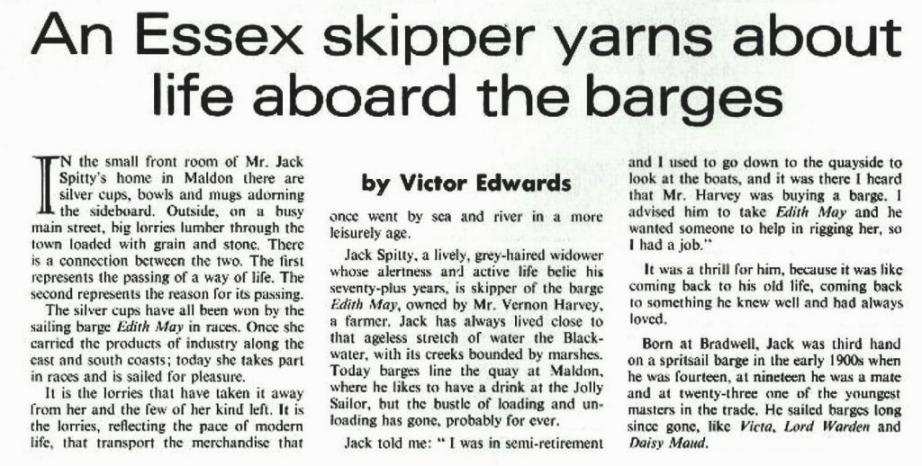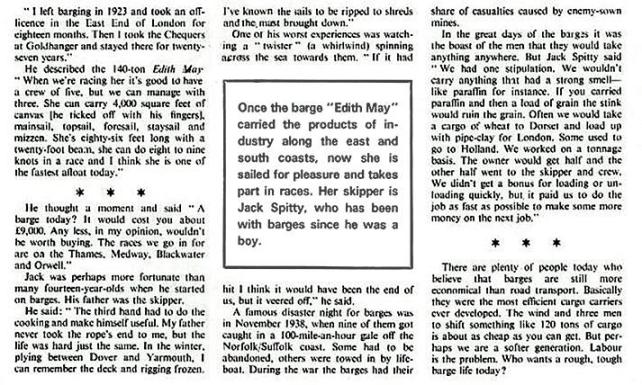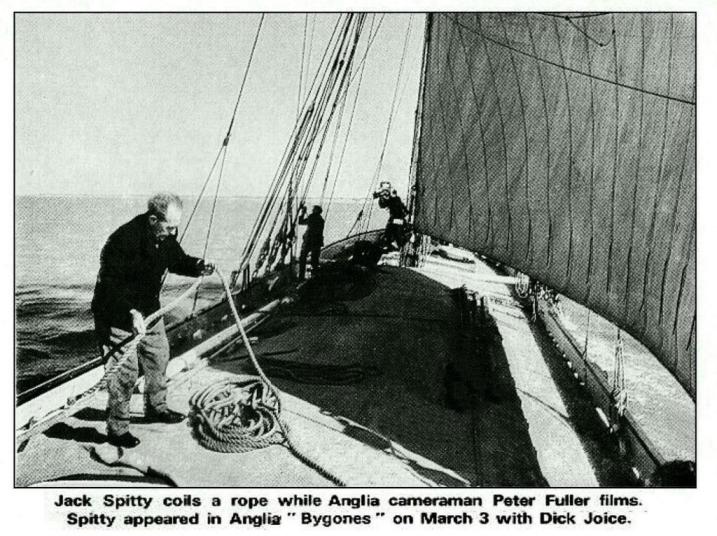1892
- 1972
Landlord
of The Chequers

and
famous Thames Barge Captain
Jack Spitty was the Landlord of the Chequers Inn at Goldhanger between 1926 and 1953. He is identified on the plaque in the Inn as the Friendly Brothers treasurer between those same years, and there are various parish magazine and local newspaper reports of Jack and his wife participating in village activities. Throughout East Anglia however, he was much better know in as an accomplished and popular bargeman who won many trophies as captain of the barge Edith May. The Jack Spitty Trophy is presented annually by the Blackwater Sailing Barge Association in his honour.
He was the son of the well known Essex fishing smack skipper of the same name who had a reputation as a smuggler. Such was his enthusiasm for barge sailing the he named his children after the barges he had worked and sailed on. In 1972, at the age of 80 and in the year of his death, Anglia Television produced a programme about Jack Spitty and his barge Edith May as part of the Bygones series…

The programme is available on Youtube at…
www.youtube.com/watch?v=97xZYArAYp0
(search Youtube for “Jack Spitty”).
It includes Jack’s own voice and recollections, which are transcribed
here…
My first trip on a barge was
at ten years of age on school holidays, and I went on this trip with a cargo of
flour from London to Poole. My parents couldn’t afford to put me through
college or anywhere to get a good education. Then in 1903, my father, he was
skipper of the barge called Warden Elite, and his third hand left so he said to
me “I think boy, you will have to come with me”, I was as pleased as could be,
and off I went at the age of 14. That was my start. I got three shillings a
week and my keep.
Our general cargoes were
corn, timber, coal, stone work, and horse straw, we used to take them from
mostly London to Dover, Yarmouth, Ipswich, Colchester, Maldon, all around the
coast, and I remember loading out of a sailing ship once with guano, that’s
birds droppings, that was a smelly old cargo for fertilizing, going to Ipswich.
There were times when there
wasn’t much work about, and we used to what we called “seeking work”. We used
to lay at the bys in London river and go up to the city and go round the
brokers offices to get a freight, and that was the skippers responsibility,
nothing to do with the owner whatever. It was a skilful job sailing a barge up
London river, and the river was so congested then, sometimes we had a cargo of
hay and straw, and that was about half-way up the mast, you couldn’t see a
thing from the wheel, you had to rely on the mate up on the stack to tell you
where to go.
This old barge was built in
Harwich, Essex by a man named Kev. who I consider to be of the best builders of
barges ever, and in a breeze she’ll do 8 to 9 knots with a cargo, and it’s a
great thrill when they are getting along like that. One year she won all the
four races, which is Thames, the Medway, the Blackwater and the Orwell, and
there is no other barge that has done it. She is one of the fastest there is in
my opinion afloat today, and I don’t think there is many will dispute that.
Below are short extracts from newspapers and other
publications that refer to Jack and his
relatives…
Wikipedia.org/Rowhedge
One of the pre- First World
War village characters was John(Jack) Spitty
- salvager
(saving goods by removing them from ship-wrecks), pub licensee, fisherman and
smuggler. His use of a bedroom in the Royal Oak public house when he was the
licensee to hide boxes of Dutch cigars was brought to a halt by his wife. She
put her foot down after the pub was unsuccessfully searched by customs men. He
would also sometimes swap sprats for coal at sea after a rumbustious verbal
exchange with an obliging collier's skipper; the fuel was used in his smack's
shrimp boiler.
A special beer was produced in memory of Jack Spitty senior for the Rowhedge Regatta
in 2013…

Essex Standard, August 1869
John Spitty won races at the Colne
Regatta with his a 34 ton fishing vessel called Blue Bell.
Essex Chronicle, April 1913
It is feared that James
Spitty, an ancient mariner, of Bradwell-on-Sea, has been drowned at
sea, as fragments of his boat have been
washed ashore.
and these publications refer to Jack
himself (difficult to
put in chronological order)...
A 1920s postcard on the Barge Lord
Warden moored in Salcot Wharf when Jack Spitty was the
skipper. He is said to have met his wife to be here and was married later in
Salcot Church and their son was later named Victor Warden Spitty.
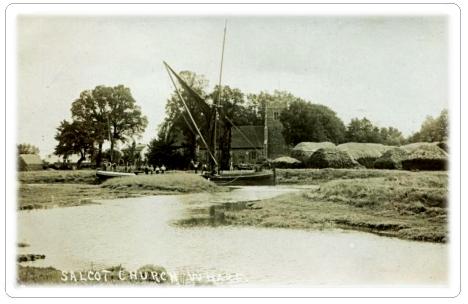
Essex Newsman June 1939
At Witham Petty Sessions on Tuesday, Jack Heard Spitty, landlord of the Chequers Inn, Goldhanger, was summoned for allowing children to be in the bar of his licensed premises on May 29th. Mr Wade, of Colchester, for defendant, pleaded not guilty. Spitty said he had been landlord of the Chequers for 13 years and had never had a complaint against him before. The Chairman said the Bench were satisfied the landlord did not exercise due diligence in keeping the children out of the licensed house. He would be fined 40s.

Jack can be seen outside The
Chequers (2nd from left)
in this 1937 photo of the Coronation
celebrations
Pin Mill Sailing Club Sixty Years R M Waite, 1995
By 1966 the Barge Match Committee was well organised and some very successful Matches took place. The reputation of the Pin Mill Sailing Club Barge Match was growing and each year the number of entries increased… The Sailing Barge Association helped to put together an East Coast working team to bring barges up to the standard required to obtain their certificates of seaworthiness and thus enable them to carry passengers and the racing crew beyond the smooth water limit. Thirteen barges took part in the 1966 Match, using a rounding mark up the Stour, off Harkstead Point and various marks back to Pin Mill. Capt. Jack Spitty, skippering the Edith May crossed the finishing line first.
Salty Shore John Leather, 2003
Jack Spitty, son of the noted smack skipper of the same name, skippered the barges Lord Warden and Victa as a young man in the coasting trade. Just after the First World War he worked up the tortuous upper reaches of Salcott Creek to berth the 50-ton Lord Warden then owned by Clement Parker of Bradwell. This was a prime example of the versatility of the spritsail barge; loading a haystack in the heart of a village for delivery to the bustle of the capital.
Sea Breezes Publications August 2011
…at Ipswich Geoff Gransden was given a trophy for ‘Excellence’ for spending over ten years rebuilding the Edith May. The Edith May was originally built at Harwich in 1906 and became a motor barge until 1961 when Vernon Harvey had her rigged out for sailing again. In the 1970s, under skipper Jack Spitty she won most of the races. She then became a museum ship at Liverpool, but was returned to Maldon in 1987.
The Modern Fowler James Wentworth Day, 1973
Page 26 - The Chequers, a big, four-hundred-year-old inn with some genuine panelling, fine old beams and floors that go up and down in waves, is kept by Jack Spitty, son of the famous old seaman-gunner, Captain Spitty of Bradwell Quay…
Parish Magazine of 1931, The Goldhanger Friendly Brothers Supper
The annual Supper of the Goldhanger Friendly Brothers was held at the Chequers on Saturday May 22nd, when a company of about seventy sat down to a repast most excellently served by Mr. and Mrs. Spitty… The balance sheet showed that in spite of an adverse year, the Club is still going strong both financially and in membership, the Reserve Fund rising to a total of over £37. A most enjoyable evening followed, Mr. Parker presiding at the piano.
Chelmsford Chronicle, July 1937
BELL RINGING FESTIVAL - On Saturday a meeting of the South-Eastern Division of the Essex Association of Change Ringers was held at St. Peters, Goldhanger, under the direction of Dr. Spencer Phillips, master of the Association. The Service was conducted by the Rector, the Rev. R. Gordon Roe. Mr. Jack Spitty prepared a splendid tea at the Chequers. One member present was a boy of thirteen who has qualified for full membership by ringing a peal of 720 changes.
Sea Breezes: The Ship Lovers' Digest Volume 44, 1970
Page 574 - The Edith May, skippered by 78-year old Jack Spitty, led virtually from the start and completed the course from Osea Island Pier to the Wallet Spitway buoy and back up the Blackwater estuary to Maldon Promenade.
The best of the Saturday Book John Hadfield, 1981
Page 175 - The Edith May, built at Harwich fifteen years after the May, skippered by seventy-nine-year-old Jack Spitty, won the 1971 Blackwater sailing barge race.
Britain's Maritime Heritage Robert Simper, 1982
Page 124 - In 1965 the Edith May, skippered by Jack Spitty, became the first barge to win all the season's races. However, her success was greatly aided by having a larger sail area than most of her rivals.
Down Tops'l : The Story of the East
Coast Sailing-barges Hervey Benham, Roger Finch,
P Kershaw, 1986
Page 65 - Caption to a photo
of barge at Salcott: The Lord Warden
at Salcott unloading flints, c1920. Her skipper at this time was Jack Spitty. On this trip the Lord Warden's
skipper met his future wife, and they were married in the church hard by. Their
son has been named after the barge…as Victa Warden Spitty.
Barge race at Southend in
1970 with Jack at the helm...
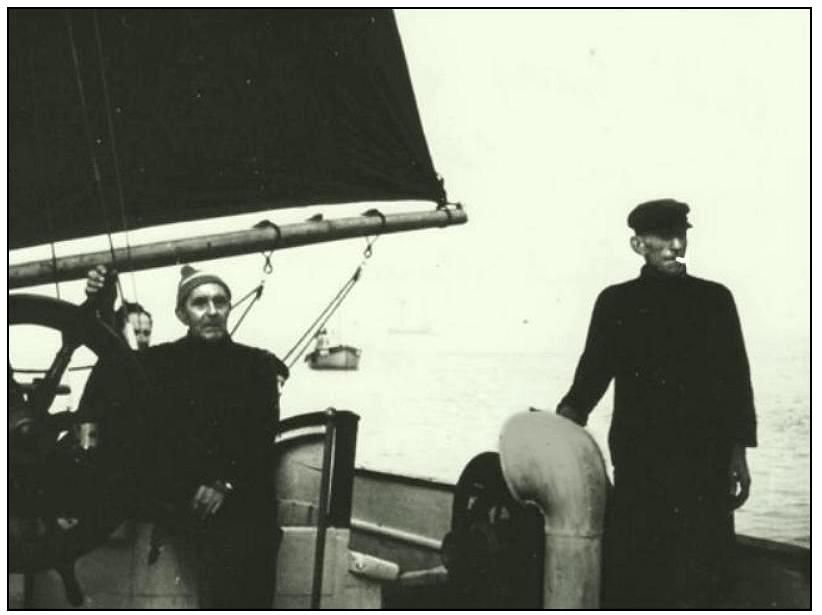
East Coast Digest winter 1972
A Champion Remembered
Captain Jack Spitty who died in August 1972 in his eightieth year was one of the best loved personalities on the East Coast, and the news of his death came as a personal loss not only to the bargemen but to everybody who had known him, however briefly.
Jack was probably best known as Racing Skipper of the Champion Barge Edith May, which he rigged out for her owner Vernon Harvey in 1962. Before then he had skippered Vemon's Edith and Hilda. in Edith May Jack had remarkable success, the barge was magnificently fitted out and he sailed her to perfection, right up until a few months before the end. Jack came from a long line of Essex smacksmen, going to sea in Parker's Bradwell owned barges and becoming Master of Lord Warden, Water Lily and Victa. Before the Great War he was trading regularly to Faversham and Oare with haystacks from Suffolk, returning with ragstone loaded at Mill Hall on the Upper Medway.
East Coast Digest asked Stanley Cook if he would write a short tribute: “l suppose it was the sudden finish of his very active life which affected me, as I felt I had lost a good friend. He was always the same, and a good example of how a gentleman should behave. I feel proud to have known him, and I am pleased that he won his last race as Skipper of Edith May. One of his best races ever this was to be and the last lime I saw him. Shortly before his death I went to call on him at his daughter's house at Abberton, He would not see me, and his daughter, Edna, brought me the message that: 'It's not that I don't want to see you, Stan, it's that I don't want you to see me.”
Jack was married at the little Salcot church, in the village where he had met his bride-to-be, after taking Lord Warden up into the creek there. As a young man he left sailing barges and took a public house in London, then after taking a second pub went farming near Kelvedon, Finally, he was landlord of The Chequers public house at Goldhanger for 26 years, during and after the war.


Evening Gazette August 1972

Essex Countryside article in 1972 - about Jack Spitty & the Edith May Barge...
Goldhanger Parish Magazine 1972 obituary by Winsome Hopwood...
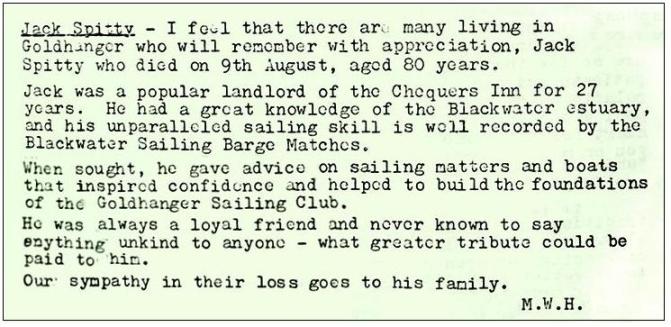
Sailing Barge Association website - Blackwater Sailing Barge Match
Association...
2010 Prizes: The Jack Spitty Trophy - awarded for Merit on the Chairman's recommendation.
top characters
from the past home
